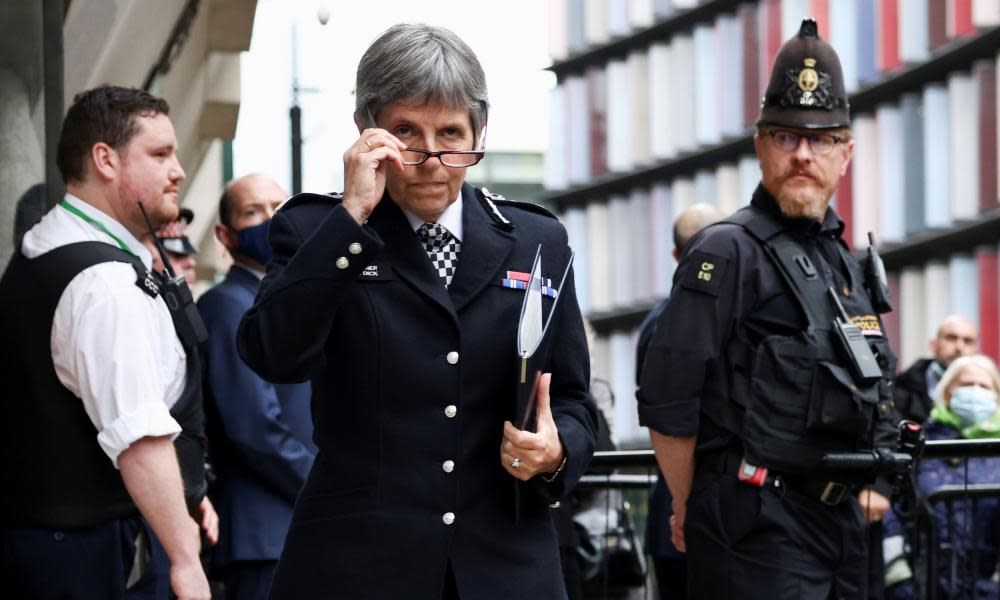The Observer view on institutional misogyny in the Metropolitan police

The arrest, then kidnapping, rape and murder of Sarah Everard by a serving Metropolitan police officer have irrevocably shaken public confidence in the police. Last week, as her murderer was sentenced, her family read out their statements in court. “She was caring, she was funny. She was clever, but she was good at practical things too. She was a wonderful daughter… She was a good person. She had purpose to her life,” Susan Everard, Sarah’s mother, told her murderer.
An unbearable agony has been inflicted on her family and loved ones. And women have watched in horror as the details of her murder have become public and the response of the Met has been to put more emphasis on how women can keep themselves safe from dangerous police officers than on the deep-seated reform needed to address its own institutional misogyny.
As a male-dominated institution, the police are vulnerable to societal cultures. Abusive and violent men are attracted to professions that offer power and control. And the state confers huge powers on the police in order to maintain law and order and protect victims of crime. To learn of a police officer using those powers to kidnap and murder a woman – using his warrant card to arrest her, his police-issued handcuffs to restrain her so she cannot fight back – fatally erodes the principle of policing by consent, the idea that police authority is contingent on public approval and on the police’s ability to maintain public respect. In the words of the judge who sentenced him: “If that is undermined, one of the enduring safeguards of law and order in this country is inevitably jeopardised.” Red flags about this officer – several allegations of indecent exposure, including one just days before he murdered Everard; the fact he was reportedly nicknamed “the rapist” by colleagues; the lewd and misogynistic messages he and other officers allegedly shared via WhatsApp – were either ignored or not picked up.
The leadership of the Met had months to prepare its response to the sentencing. It needed to acknowledge its devastating failings, request an independent inquiry into institutional misogyny within the force and announce changes it has made to vetting and safeguarding in light of Sarah’s murder. Instead, the Met commissioner, Cressida Dick, failed to announce any actions in her statement, and the deputy commissioner, Steve House, insisted there was “zero tolerance” for misogyny in the force even as it transpired that two Met officers who allegedly swapped misogynistic and racist messages with Everard’s murderer have been left on duty.
Related: Sarah Everard murder: five voices demanding police reform
The Met has issued utterly inappropriate guidance to women on what to do if they suspect the motives of a lone police officer, including flagging down a bus, challenging the officer and calling 999 to verify their identity. This further contributes to the erosion of policing by consent: the only thing that will reassure women will be if the Met demonstrates it can trust police officers wielding an arrest warrant as a result of changes it has made to its own vetting and safeguarding processes.
Restoring faith in the police requires an inquiry of the sort that followed the murder of Stephen Lawrence. There are undoubtedly many frontline police officers who show immense bravery and dedication to public service. But they and the public are being failed by a rotten leadership culture that has not addressed the numerous signals that the Met and other forces still have an issue with institutional misogyny and racism. Undercover Met officers stole the identities of dead children to trick women into having long-term relationships, and even children, with them; last week, judges ruled this was a gross violation of human rights. The Centre for Women’s Justice has filed a super-complaint about police failures to investigate police officers accused of violence and abuse against women. Two Met officers have pleaded guilty to misconduct after taking and sharing photos of themselves with the bodies of Nicole Smallman and Bibaa Henry, two sisters who had been knifed to death. A report by the police watchdog has found “problems, unevenness and inconsistencies” in the way forces address male violence against women.
These failings of the police have occurred against a backdrop of a broader societal failure to address and prevent male violence against women and girls. A woman is killed by a man every three days in this country. These femicides are the tip of the iceberg of the epidemic of male violence against women and children, yet refuge and support services for abused women have been cut, abuse victims are shunted towards women’s prisons, and falling rape and domestic abuse convictions, which have arisen partly as a result of government cuts to the police, prosecution service and courts, are effectively decriminalising male violence against women.
All the emphasis is on women changing behaviour to protect themselves but there is an overwhelming lack of strategy to prevent male violence by working with perpetrators of domestic abuse and fostering healthy attitudes towards women and girls among boys. Male politicians apparently feel empowered to carelessly advocate for the end of the single-sex safe spaces that are protected by the Equality Act without acknowledging the consequences for women traumatised by male violence.
Male violence against women should be treated as of the same order as other ideologically motivated violence against a class of people: as terrorism. This would mean far more resources going into preventing the deaths of more than 100 women a year and the abuse of many, many more women and children. But the Met’s dreadful response to Sarah Everard’s murder shows this cannot happen without an independent inquiry into the institutional misogyny of Britain’s largest police force. This must be announced without further delay by the prime minister this week.

 Yahoo News
Yahoo News 
